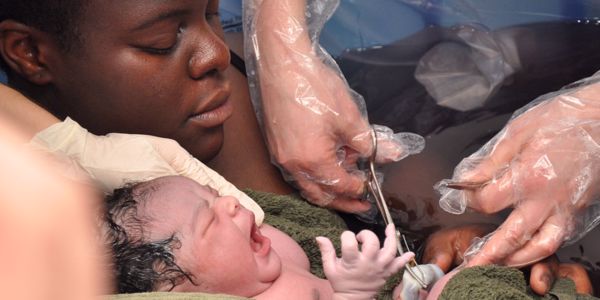Most people have heard of at least one miracle cure for the hiccups. Holding your breath, getting startled, or swallowing a spoonful of peanut butter are all popular options. But what about when you aren't the one with the hiccups?
Many women are surprised that their babies can have hiccups in the womb, and moms can feel them! There's nothing quite like going about your day and feeling a constant stream of your baby's hiccups.
What Causes Fetal Hiccups?
Fetal hiccups are a normal and expected part of pregnancy. Like most movements your baby does in utero, they are a miniature reflection of life outside the womb. As for the specific cause of fetal hiccups, doctors are not sure. While there have been theories such as having something to do with developing lungs, none of these theories have been proven.
While your baby isn't breathing air yet, their lungs are practicing with amniotic fluid. As your baby "inhales," their diaphragm moves downward and outward. Hiccups follow this same motion, only stronger.
When Will My Baby Hiccup?
Just like you, your baby's hiccups are relatively unpredictable. You can generally start feeling your baby move between weeks 16 and 20. As for being able to discern hiccups precisely, most people notice them in the second or third trimester.
Are They Hiccuping or Just Kicking?
Unlike kicks, hiccups will follow a rhythmic pattern for a sustained period. Usually, "kicks" (which could be from any part of your baby, not just their legs) will be more isolated.
When Should I Worry?
Fetal hiccups can be incredibly cute, especially in the beginning when they are new! But after some time, you may begin to feel concerned and wonder if your baby's hiccups are anything you should worry about. Hiccups are typical and expected, so they are likely a good sign that your baby is growing and developing properly.
However, after 32 weeks, if your baby is hiccuping daily with prolonged or frequent episodes (15 or more minutes each or three episodes in a day), you may want to contact your doctor for peace of mind and to ensure there is nothing to be concerned about. It's always better to be safe than sorry when it comes to your pregnancy. You cannot call your doctor's office too frequently, and none of your questions are too silly to be discussed and taken seriously.
Can I Stop My Baby's Hiccups?
Hiccups (yours or your baby's) can distract and make it difficult to focus or sleep. If your baby is prone to hiccups or has been hiccuping for a while, you may be anxious for them to stop. Unfortunately, just like adult hiccups, there are no proven "cures." Instead, you can focus on ways to ease your discomfort. Some of these ideas include:
- Moving or exercising to distract yourself from the sensation
- Lying on the left side of your body to help circulation
- Drinking a sufficient amount of water to stay hydrated
- Going to sleep or taking a nap if possible
- Visiting with a friend or watching funny videos to change your focus
Fetal hiccups can be an excellent opportunity to share those precious baby movements with your partner or loved ones as they give you more time to catch the movements and have others place their hands on your moving belly. So, while hiccups can be annoying, they are just a short, fun part of your pregnancy experience!







